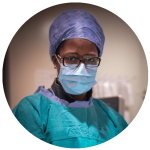
Dr. Kebby King
As we continue our search to find IRs across the country working hard to improve patient care, we heard via an IR in London, England (Dr. Clare Bent), who told us about Dr. Kebby King, who is an IR in Peterborough. Dr. King has been in practice in Peterborough, Ontario since 2009, after completing a Radiology Residency at U of T and an IR fellowship at UHN. Dr. King is currently the lead for the Department of Interventional Radiology at the Peterborough Regional Health Centre. Kebby did her medical training in the Caribbean and was initially on an internal medicine training tract when she saw the light and switched course to IR! Dr. King was drawn to IR for its ability to directly and immediately impact patient outcomes, something she felt was missing from internal medicine.
After fellowship Kebby started working in Peterborough as a community IR. Her practice is heavy in peripheral vascular intervention and she enjoys a good working relationship with the vascular surgeons there. Over the years she has been working along with her 3 IR partners to grow the interventional oncology program and provide 24/7 IR call. Dr. King’s experience working in the Caribbean where there is limited IR access gave her a unique perspective as she has seen how lack of IR limits life saving treatment options for patients and how access to IR improves patient care and outcomes.
Over the past 13 years in practice, Dr. King has seen a slow decentralization of IR with a growing expectation that patient care be provided close to home if possible, which is something the authors have also seen over our careers thus far, this has led to more complex cases staying in the “community” hospitals, expanding the practices of community IRs. As a result the patients benefit from the care and support of family and a familiar environment and the larger tertiary and quaternary care centers are not overwhelmed with patients.
When asked if she has any advice for IR fellows or new to practice her suggestions are to do and see as much as you can, develop relationships with referring clinicians, always be willing to help out, and work work work. We think that is pretty good advice no matter where we are in practice.